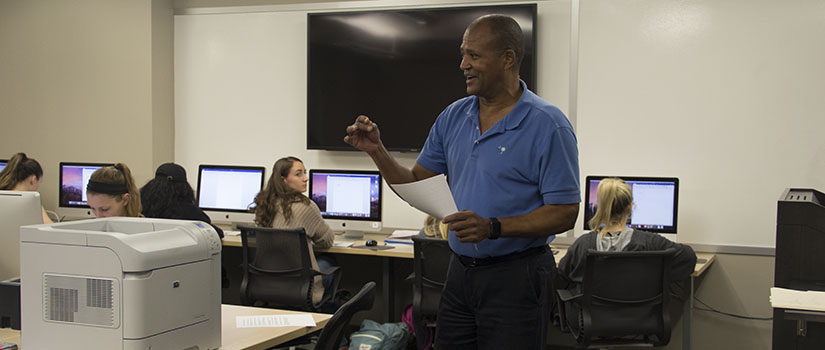By Justin Brouckaert, scholastic media assistant
Photos by Karie Grace Duncan, scholastic media student assistant
Posted February 8, 2017
Growing up in a family of educators, Bertram Rantin always thought he’d follow his parents’ footsteps. He chose a different route instead, but after a long career in journalism, he’s come back to his teaching roots.
Rantin has taught in the University of South Carolina School of Journalism and Mass Communications for 15 years. But before that, he spent 30 years at The State, covering everything from sports to local government, in addition to working as a section editor, assistant editor and columnist.
“Rather than spending the entirety of a career doing one thing, I was always interested in learning about different things,” Rantin said. “I think sometimes now people try to specialize …a little bit too early. What they need to think about is being good storytellers, because if you’re a good storyteller, you can tell a story about a community, you can tell a story about an athlete, even if you don’t know a whole lot about sports.”
Rantin has recently expanded his teaching duties at USC while also working as a communications specialist for the Palmetto Health-USC Medical Group and the public relations coordinator for the South Carolina State Fair. He says he’s happy to be at the intersection of two things he loves: writing and teaching.
“I believe firmly in the foundation of writing. I tell students all the time that many of them will likely go on to be much more creative than I would ever think about, but they can only be as creative as they are competent in telling the story with a strong grammatical structure,” Rantin said. “Lots of our students, their intellect is no lower than students who came up ten, 15 years ago, but more and more of them are not getting the writing reps to build what I’ve come to address as the academic muscle memory.”
For Rantin, those reps came early. When he was in eighth grade, he followed his older brother onto the newspaper staff at Manning High School.
“I basically hung around and wanted to do something. So to get me out of their hair, they shoved a camera in my face and made me a junior photographer,” he said. “That was the beginning.”
The journalism program at Manning High School was heavily involved in both SCSPA and SIPA. Rantin served as vice president of SCSPA and president of SIPA. He was also named SCSPA’s Journalist of the Year in 1977.
“That was kind of nice,” Rantin said. “I remember my name being called and walking up and going back and hugging my mom and my high school adviser. Some of those things, you don’t forget.”
As a high school student, Rantin had a hard time deciding whether he wanted to study journalism or music. But once he made his decision, he knew where he wanted to hone his craft.
“The decision, when I finally did choose journalism, it was kind of a no-brainer,” he said. “If I’m going to study journalism, I’m going to USC.”
Rantin graduated from USC in 1981 with a bachelor’s degree in journalism. During that time, he was a reporter and copy editor for The Gamecock and assistant editor for the Garnet & Black.
“I like to feel like when I look back now, that I was practicing what I preach today,” he said. “If this is something you think you want to do, why wouldn’t you being doing it now?”
Years later, Rantin still values his time in scholastic media.
“Really, that’s when I got the earliest taste of networking. You learn that it’s bigger than your high school, it’s bigger than your community, it’s bigger than your town,” Rantin said.
He’s also given back as an instructor at previous SCSPA conferences. He said those experiences reminded him of the dedication and enthusiasm so many scholastic journalists have.
“I think when someone comes to scholastic conventions, for the most part they’re there because at that point they’ve really made that commitment, and they’re dialed in, so to speak,” he said. “They’re not looking down. They’re making eye contact, and they’re really taking in what you say. As best as I can recall, that’s the way it was when we were on the other side of things.”
The advice Rantin has for scholastic journalists is the same he gives his college students: read widely and get involved.
“Any opportunity I get, I tell people to read, read, read,” Rantin said. “It sound so trite and it sounds so old fashioned, but it’s just not going to change. You need to be in touch with the language, you need to be in touch with what’s going on.”
